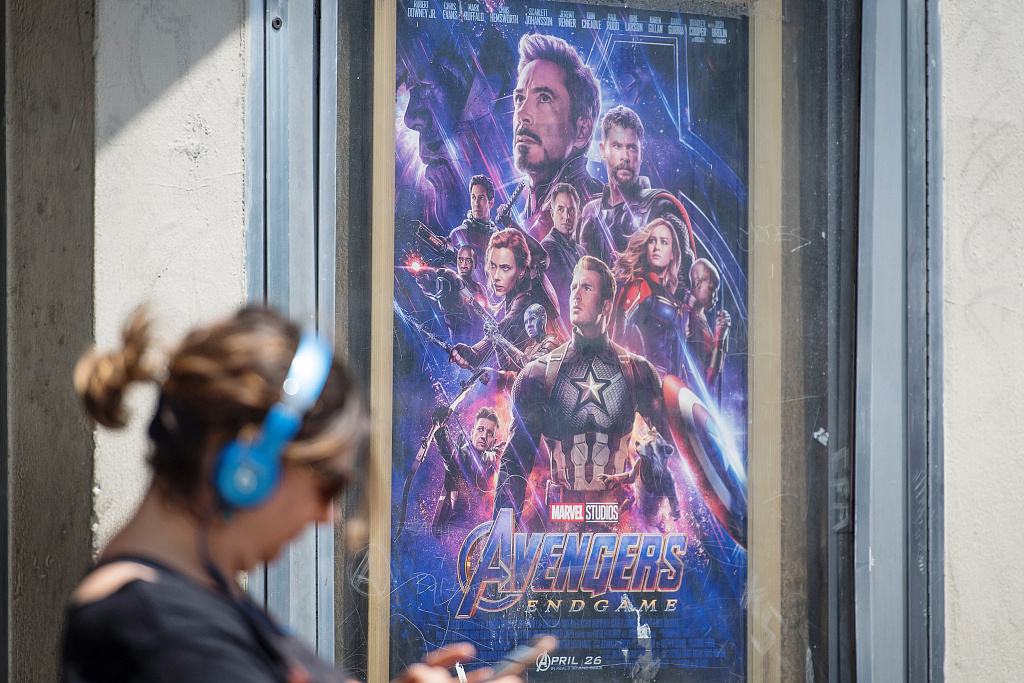
Director Martin Scorsese attends the special advance screening of 'The Irishman' at the Castro Theatre in San Francisco, United States on November 5, 2019. /VCG Photo
Director Martin Scorsese attends the special advance screening of 'The Irishman' at the Castro Theatre in San Francisco, United States on November 5, 2019. /VCG Photo
Martin Scorsese's dismissal of Marvel films as "not cinema" has split Hollywood and moviegoers, sparking reactions from full-blooded support to accusations of hypocrisy and elitism.
The Oscar-winning director penned a New York Times op-ed this week in which he argued superhero blockbusters lack the sense of risk, mystery and complex characters vital to the "art" of film-making.
Marvel films are "market-researched, audience-tested, vetted, modified, revetted and remodified until they're ready for consumption," wrote the "Goodfellas" director.
"They lack something essential to cinema: the unifying vision of an individual artist," Scorsese added, fueling a controversy he initiated in a magazine interview last month.
Fellow luminaries such as Francis Ford Coppola, Ken Loach and Fernando Meirelles have backed Scorsese, with Coppola even calling the record-breaking Marvel franchise "despicable." Top Hollywood film critics have also endorsed the auteur's position.
"Scorsese is basically a film climatologist, pointing out a sinister change we can all see with our own eyes," tweeted David Ehrlich, senior film critic of Indiewire. "Glad he said this, sad he had to," he added.
But the rejection of film's highest-grossing franchise has provoked debate in Hollywood about what constitutes "art," and who gets to define it — not least because of Scorsese's admission that he has only "tried to watch a few of them."
"That's just not good enough — you can't dismiss an entire genre as uncinematic without watching them," said Tom Nunan, an Oscar-winning producer and professor at the University of California, Los Angeles School of Theater, Film and Television.
"People have always been vocal when they see change going on and it makes them uncomfortable," Nunan ("Crash," 2006) said, pointing to the arrival of 1970s smash hits like "Jaws" and "Star Wars."

'Avengers: Endgame' poster at the Grand Lake theater in Oakland, California, U.S. /VCG Photo
'Avengers: Endgame' poster at the Grand Lake theater in Oakland, California, U.S. /VCG Photo
Bob Iger, CEO of Marvel parent company Disney, last month described Scorsese's original comments as "so disrespectful to all the people that work on those films."
Natalie Portman, who has appeared in several Marvel films and will star in the next "Thor" movie, told The Hollywood Reporter there was "not one way to make art."
But those rebuttals were nothing compared to the fury from Marvel's army of obsessive fans, who have taken to social media to vent their rage.
Countless tweets have painted Scorsese as elitist, with many pointing to box office figures showing nine Marvel films in the 25 top-grossing movies of all time.
Marvel lovers said that to fully enjoy all-time record holder "Avengers: Endgame," you need to have seen the preceding 21 movies, due to their interconnected storylines and characters.
"What's happened over time is there's a knee-jerk reaction of the old guard in Hollywood," said University of Southern California adjunct professor Gene Del Vecchio.
Fueling the controversy is the release of "The Irishman," Scorsese's 160 million dollars-budget crime epic, by streaming giant Netflix.

Martin Scorsese attends the Premiere of Netflix's 'The Irishman' at Chinese Theatre in Los Angeles, United States. /VCG Photo
Martin Scorsese attends the Premiere of Netflix's 'The Irishman' at Chinese Theatre in Los Angeles, United States. /VCG Photo
In his op-ed, Scorsese said the distinction between Marvel and "cinema" matters because superhero sequels are crowding auteurs out of movie theaters — the place "where the filmmaker intended her or his picture to be seen."
"The Irishman" is currently in theaters, but only for a relatively miniscule 26-day window before it shifts to Netflix's small-screen streaming platform. "Endgame," by comparison, was still showing in picture houses four months after its release.
"Would I like the picture to play on more big screens for longer periods of time? Of course I would," Scorsese wrote.
But Nunan described Scorsese's position as "hypocritical at minimum."
"When did he become the God of cinema? He's in business with the very company that many people accuse of destroying cinema."
(With input from AFP)